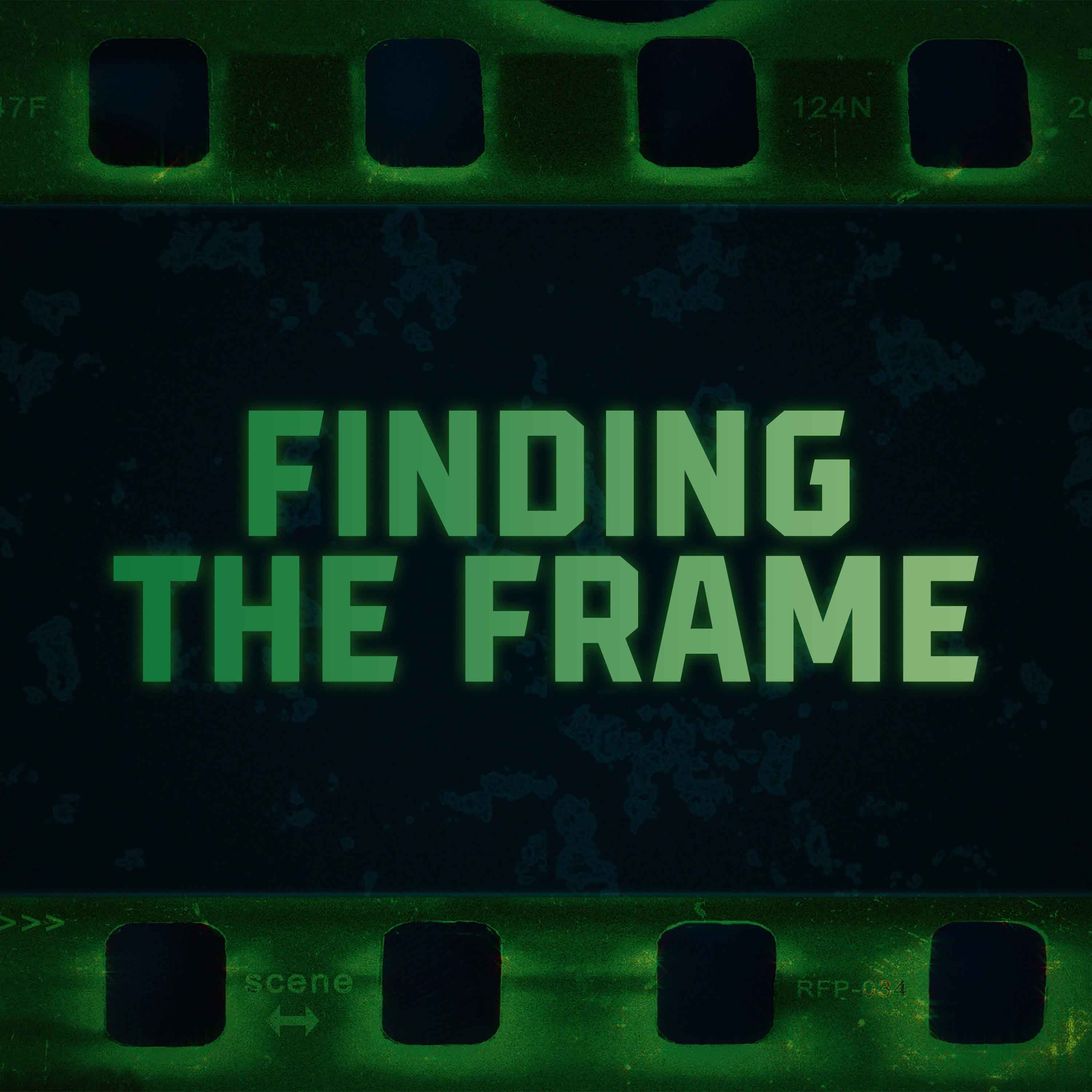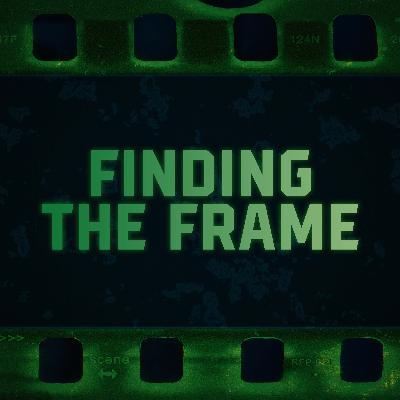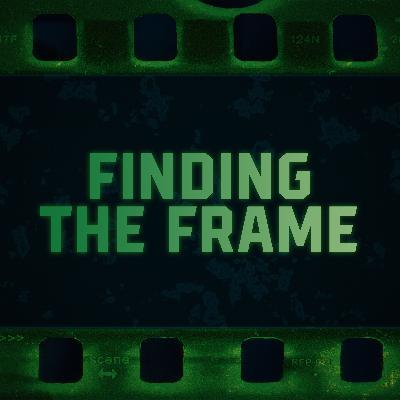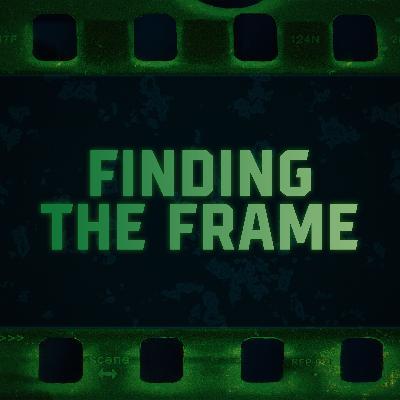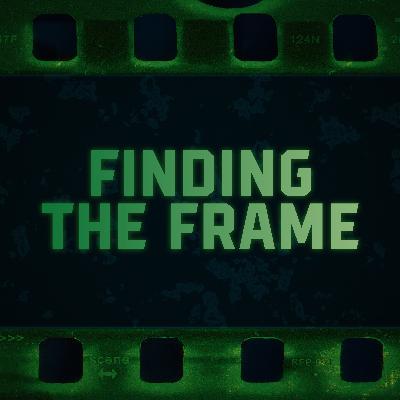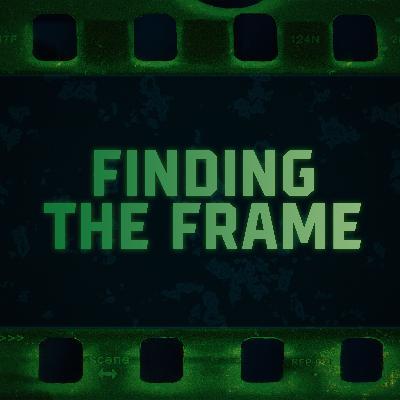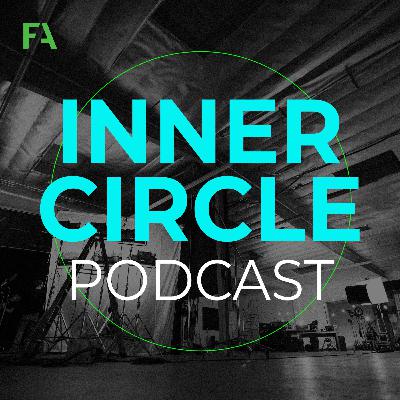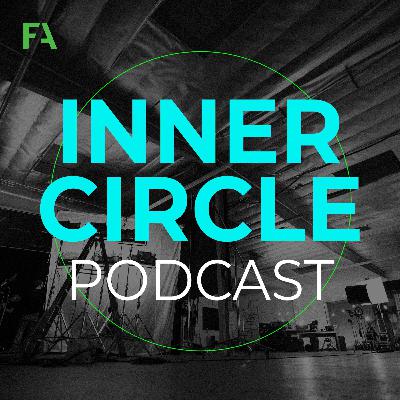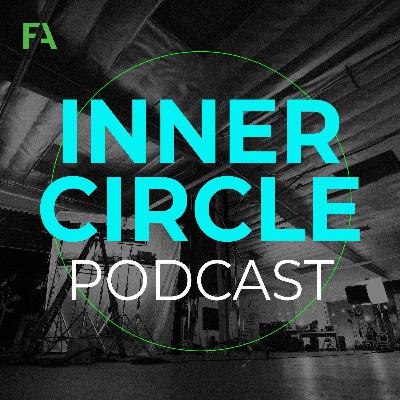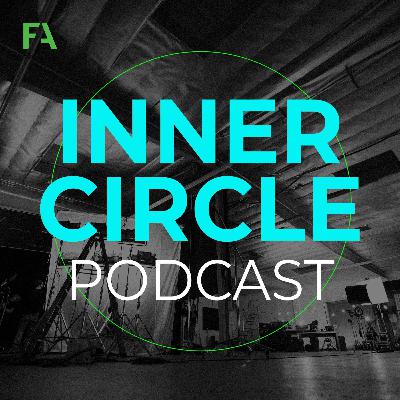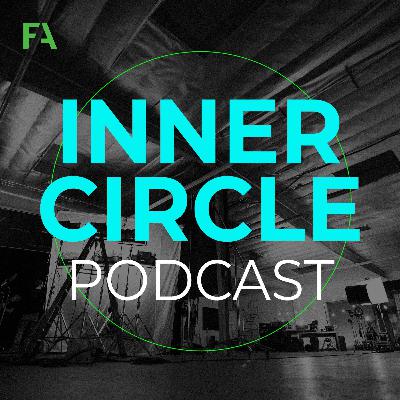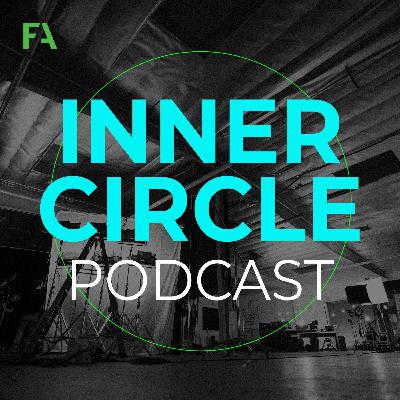Discover Filmmakers Academy Podcast
Filmmakers Academy Podcast

Filmmakers Academy Podcast
Author: Filmmakers Academy
Subscribed: 100Played: 1,849Subscribe
Share
©2023
Description
Filmmakers Academy presents two of the film industry’s most unique and reliable podcasts for professionals who work behind the camera. We explore the latest trends, interview industry leaders, and offer leadership and lifestyle guidance tailored to fit the needs of filmmakers.
Stop what you’re doing this very moment and subscribe to Filmmakers Academy to watch LIVE episodes for free on the FA Platform! While full audio episodes are available on Spotify and Apple Podcasts, you can watch past episodes on the FA platform as a member of Filmmakers Academy.
The Inner Circle Podcast is Filmmakers Academy’s flagship podcast hosted by Lydia and Shane Hurlbut, ASC. Together the duo chats with everyone from industry leaders in the film industry to health experts and beyond, spotlighting subjects useful to filmmakers pursuing successful and sustainable careers. *In addition to new episodes is a robust archive containing a wealth of knowledge.
Finding the Frame is not so much an interview series as it is a lounge-sesh with your favorite filmmakers. Hosted by Brendan Sweeney, prominent filmmakers from ASC cinematographers to Oscar winners visit the studio to dish about their careers and approach to the craft.
BAFTA Breakthrough Cinematographer Aaron Reid praises Filmmakers Academy as “a valuable learning resource for film craft” that “pushes learning film into the future.” Online Filmmaking Courses rates Filmmakers Academy 5/5 stars as the best-advanced filmmaking training platform! A trusted partner of Academy Gold Rising, British Cinematographer, RED Digital Cinema, and many other industry titans, visit FilmmakersAcademy.com to see how filmmakers like you are scaling successful careers in the film industry.
We also keep past SIC episodes in our archive dedicated to cinematography, how to navigate your career, and leadership, hosted by Filmmakers Academy CEO Lydia Hurlbut and cinematographer Shane Hurlbut, ASC
Filmmakers Academy is a subscription-based streaming platform developed to educate and inspire filmmakers to enrich their storytelling and technical skillset. Through on-demand lessons, podcasts, and courses across multiple disciplines, filmmakers at any level of experience will learn from our elite team of industry-leading professionals.
Stop what you’re doing this very moment and subscribe to Filmmakers Academy to watch LIVE episodes for free on the FA Platform! While full audio episodes are available on Spotify and Apple Podcasts, you can watch past episodes on the FA platform as a member of Filmmakers Academy.
The Inner Circle Podcast is Filmmakers Academy’s flagship podcast hosted by Lydia and Shane Hurlbut, ASC. Together the duo chats with everyone from industry leaders in the film industry to health experts and beyond, spotlighting subjects useful to filmmakers pursuing successful and sustainable careers. *In addition to new episodes is a robust archive containing a wealth of knowledge.
Finding the Frame is not so much an interview series as it is a lounge-sesh with your favorite filmmakers. Hosted by Brendan Sweeney, prominent filmmakers from ASC cinematographers to Oscar winners visit the studio to dish about their careers and approach to the craft.
BAFTA Breakthrough Cinematographer Aaron Reid praises Filmmakers Academy as “a valuable learning resource for film craft” that “pushes learning film into the future.” Online Filmmaking Courses rates Filmmakers Academy 5/5 stars as the best-advanced filmmaking training platform! A trusted partner of Academy Gold Rising, British Cinematographer, RED Digital Cinema, and many other industry titans, visit FilmmakersAcademy.com to see how filmmakers like you are scaling successful careers in the film industry.
We also keep past SIC episodes in our archive dedicated to cinematography, how to navigate your career, and leadership, hosted by Filmmakers Academy CEO Lydia Hurlbut and cinematographer Shane Hurlbut, ASC
Filmmakers Academy is a subscription-based streaming platform developed to educate and inspire filmmakers to enrich their storytelling and technical skillset. Through on-demand lessons, podcasts, and courses across multiple disciplines, filmmakers at any level of experience will learn from our elite team of industry-leading professionals.
93 Episodes
Reverse
Thanks for joining us for another episode of the Filmmakers Academy Podcast!Ready to take your filmmaking to the next level? As a member, you'll get access to monthly virtual group coaching, exclusive networking events, and fresh content released every week.Join today and take advantage of our Holiday Promotional Offer—the lowest price on Annual Membership we've ever offered: https://learn.filmmakersacademy.com/holiday-promotion-2025-secondary/This episode is proudly lit exclusively by Nanlux-Nanlite Lights and sponsored by B&H and Hollyland.In this episode of Finding the Frame, host Chris Haigh sits down with acclaimed cinematographer Steve Yedlin, ASC, the visionary behind director Rian Johnson's films for over 30 years, including Knives Out, The Last Jedi, and the new Benoit Blanc mystery, Wake Up, Dead Man.Steve discusses his 30-year partnership with Rian Johnson and his technical approach to cinematography, moving from early visual effects fascination to developing custom digital color pipelines. He demystifies the film vs. digital debate, emphasizing that the ultimate look of a film is determined by the color pipeline rather than the camera brand, a philosophy he applied across projects like The Last Jedi to ensure consistency between film and digital formats. This foundation allows him to focus on the story's visual needs, leading to the distinct, highly stylized looks of the Benoit Blanc trilogy, culminating in the Gothic, high-contrast world of Wake Up, Dead Man.For Wake Up, Dead Man, Yedlin details complex lighting techniques: using custom software for real-time dynamic lighting cues to simulate clouds and sun changes within scenes, and integrating monitors to project realistic fire and window reflections onto actors' faces and eyeglasses. A notable logistical solution involved using meticulously hand-painted stage backdrops that allowed him to light the sky and trees separately, offering unparalleled control over day/night transitions on the soundstage. Yedlin also offers crucial advice to aspiring DPs: remain fiercely idiosyncratic and true to your vision rather than trying to be an "interchangeable cog." He concludes with a brief, skeptical take on the current state of AI, calling it a "fuzzy search engine" that primarily excels at mashing up existing content.More from Filmmakers Academy and for do-it-all filmmakers:-Cinematography: Virtual Location Scouting with the Insta360-Cinematography: The EL Zone System Exposure Guide-a...
Thanks for joining us for another episode of the Filmmakers Academy Podcast! Take advantage of monthly virtual group coaching, networking events, as well as new content released weekly by becoming a member today. Join today and get $50 off your first year by using the promo code FAPOD50. And join the #1 resource for cinematographers, film crews, and Do-It-All filmmakers!This episode is proudly lit exclusively by Nanlux-Nanlite Lights and sponsored by B&H and Hollyland.In this essential episode of Finding the Frame, host Chris Haigh sits down with Dale Nelson, the former VP of Intellectual Property at Warner Bros., for a deep dive into the legal complexities of modern filmmaking. Nelson, a partner at the leading entertainment law firm Donaldson Callif Perez, offers a rare glimpse into the behind-the-scenes legal work that protects some of the world’s biggest franchises, from Harry Potter to DC Comics.Nelson explains the dual protection of copyright and trademark for iconic properties, detailing how everything from the Hogwarts name to its visual representation is legally safeguarded. She clarifies the fine line between fan enthusiasm and piracy, and the studio's approach to protecting its brand while respecting its community. The conversation then moves into the fascinating realm of fair use, with Nelson breaking down key Supreme Court cases like the "Pretty Woman" parody case and the recent "Warhol v. Goldsmith" decision, which has redefined the concept of "transformativeness."For aspiring filmmakers and documentarians, Nelson provides crucial advice on how to navigate potential legal minefields. She identifies commonly overlooked clearance items—from artwork in the background to tattoos on extras—that can kill a distribution deal. The episode also tackles the rapidly evolving landscape of AI and deep fakes, with Nelson distinguishing between malicious deep fakes and the more common use of digital replicas in filmmaking. She discusses the legal and ethical implications, including the new protections for actors in guild agreements and the challenges of enforcement in a digital age. This is a must-listen for any filmmaker seeking to understand the legal framework that governs the industry.
Thanks for joining us for another episode of the Filmmakers Academy Podcast! Take advantage of monthly virtual group coaching, networking events, as well as new content released weekly by becoming a member today. Join today and get $50 off your first year by using the promo code FAPOD50. And join the #1 resource for cinematographers, film crews, and Do-It-All filmmakers!In this compelling episode of Finding the Frame, host Chris Haigh sits down with Colleen Bell, the Executive Director of the California Film Commission, for a deep dive into her remarkable journey and her current battle to bring film and TV production back to the Golden State. Bell's path is anything but ordinary, tracing from her beginnings as a script supervisor on "The Bold and the Beautiful" to serving as the US Ambassador to Hungary under President Obama. This diverse background has equipped her with a unique perspective on both the intricacies of Hollywood and the complex world of international policy.The conversation wastes no time in addressing the pressing challenges facing California's film industry, including a significant year-on-year drop in production and a looming state deficit. Bell, a vocal advocate for the industry, outlines her ambitious proposal to nearly double the state's film and TV tax credit program from $330 million to $750 million. She passionately explains why this substantial increase is a vital investment, citing a compelling statistic: every tax credit dollar generates an impressive $24.40 in economic activity for California.Bell draws on her experience as Ambassador to Hungary, a nation that has successfully built a thriving film industry through robust tax incentives. She candidly discusses the competitive landscape, highlighting how other jurisdictions offer more lucrative tax credits, often including "above-the-line" talent that California's current program excludes. Beyond financial incentives, Bell emphasizes the critical need for streamlined permitting processes, reduced parking fees, and improved infrastructure to make California more film-friendly. The episode also touches on efforts to support independent filmmakers and the potential impact of federal tax incentives in bolstering California's position as the entertainment capital of the world. Bell's dedication to cultivating a collaborative environment and her relentless advocacy offer a hopeful outlook for the future of filmmaking in California.This episode is proudly lit exclusively by Nanlux-Nanlite Lights and sponsored by B&H and Hollyland.
Thanks for joining us for another episode of the Filmmakers Academy Podcast! Take advantage of monthly virtual group coaching, networking events, as well as new content released weekly by becoming a member today. Join today and get $50 off your first year by using the promo code FAPOD50. And join the #1 resource for cinematographers, film crews, and Do-It-All filmmakers!Get your discount here: https://watch.filmmakersacademy.com/checkout/new?o=83067&d=FAPOD50In this episode of Finding the Frame, Chris Haigh interviews the exceptionally talented cinematographer and director Jessica Lee Gagné, known for her work on Severance, Escape from Dannemora, and Sweet Virginia. Gagne shares her journey from working in her father's video stores in Quebec City to becoming a sought-after visual storyteller in Hollywood. She discusses the formative influences that shaped her aesthetic, including the gritty realism of 1970s New York cinema and the atmospheric work of cinematographers like Gordon Willis and Owen Roizman.The conversation delves into Gagne's meticulous approach to cinematography, highlighting her collaborative relationships with directors like Ben Stiller and her detailed pre-production process. She provides fascinating insights into the unique challenges and creative solutions employed on "Severance," particularly in crafting a visually compelling narrative within the show's sterile, windowless environment. Gagne also reflects on her recent transition to directing with "Severance" Season 2, Episode 7, sharing her personal connection to the story and her approach to visual language and collaboration from this new perspective.Ultimately, this episode offers a compelling look into the mind of a dedicated artist, revealing Gagne's passion for visual storytelling, her commitment to collaboration, and her evolving journey as both a celebrated cinematographer and a promising director in the industry.
Thanks for joining us for another episode of the Filmmakers Academy Podcast! Take advantage of monthly virtual group coaching, networking events, as well as new content released weekly by becoming a member today. Join today and get $50 off your first year by using the promo code FAPOD50. And join the #1 resource for cinematographers, film crews, and Do-It-All filmmakers!In this captivating episode of Finding the Frame, Chris Haigh welcomes the visionary cinematographer Adam Newport-Berra, whose diverse portfolio spans acclaimed feature films like The Last Black Man in San Francisco and the innovative AppleTV+ series The Studio, alongside music videos for iconic artists. Adam shares his unconventional entry into filmmaking, tracing his early passion for capturing dynamic skateboarding footage in Oregon to his formal film studies at NYU. He reflects on the profound influence of Dutch cinematographer Robby Müller, whose ability to blend striking visuals with authentic storytelling continues to inspire his work.The conversation explores Adam's approach to technology, emphasizing a preference for simplicity and letting the story dictate the tools. He recounts the challenges and triumphs of creating memorable sequences, such as the intricate long dolly shot in "The Last Black Man in San Francisco," and his meticulous preparation process, which involves detailed visual references. Adam offers insights into his experience on "The Studio," revealing the creative and technical wizardry behind its signature one-shot style, drawing comparisons to cinematic masters like Altman and Kalatozov. He also discusses the collaborative spirit on set and his philosophy of empowering the entire crew.Throughout the episode, Adam shares his perspective on the art and craft of cinematography, highlighting the importance of serving the story and connecting with the emotional core of the narrative. He touches on his experiences working within established visual languages on shows like Euphoria and establishing unique looks for projects like The Bear. Adam concludes by offering valuable advice to young cinematographers, encouraging them to stay curious while trusting their own artistic instincts.
Thanks for joining us for another episode of the Filmmakers Academy Podcast! Take advantage of monthly virtual group coaching, networking events, as well as new content released weekly by becoming a member today. Join today and get $50 off your first year by using the promo code FAPOD50. And join the #1 resource for cinematographers, film crews, and Do-It-All filmmakers!In this engaging episode of Finding the Frame, host Chris Haigh welcomes the talented young cinematographer Tucker K Anderson for an insightful conversation about his journey in the film industry. Tucker shares his beginnings in action sports filmmaking in Canada, detailing his progression through various camera systems and the fast-paced environment that honed his camera operating skills. "It's an infectious energy in LA." He recounts his move to Los Angeles and his transition into the world of commercials, working with major brands and celebrities, emphasizing the importance of professionalism and creating a comfortable atmosphere on set. The discussion then moves into Tucker's experience with feature films, contrasting the often rapid pace of commercial work with the more in-depth preparation and collaborative process involved in longer narrative projects.Tucker provides a glimpse into his pre-production process, highlighting the importance of multiple script readings and extensive conversations with directors to understand their vision. He shares his perspective on how character emotions can influence cinematographic choices and his hands-on approach to operating the camera. The conversation also explores the realities of building a career in the film industry, including the significance of networking and the constant effort to gain recognition. Tucker also delves into his entrepreneurial venture, Element Filters, discussing the motivation behind creating accessible, high-quality ND filters for filmmakers. The episode concludes with a broader look at the evolving landscape of filmmaking in LA, the balance between passion projects and professional work, and the enduring appeal of human-made art in a technologically advancing industry.WebsiteIMDb VimeoElement Filters
Thanks for joining us for another episode of the Filmmakers Academy Podcast! Take advantage of monthly virtual group coaching, networking events, as well as new content released weekly by becoming a member today. Join today and get $50 off your first year by using the promo code FAPOD50. And join the #1 resource for cinematographers, film crews, and Do-It-All filmmakers!Sign up today by clicking 👉 here.In this episode of Finding the Frame, Chris Haigh interviews cinematographer Johanna Coelho, known for her work on HBO Max's The Pitt. Coelho discusses her journey from France to Los Angeles, blending French emotional storytelling with American visual language, and how her diverse education at the Sorbonne, AFI, and a French technical school shaped her visual approach. She emphasizes the importance of adapting to different projects, from documentaries to medical dramas, and her role as a "visual psychologist" in interpreting characters' emotions.Coelho delves into the innovative techniques used on "The Pitt," including a 360-degree set, custom LED lighting, and the use of the Alexa Mini LF camera. She details the challenges and collaborations involved in creating a realistic, continuous 15-hour medical drama, highlighting the meticulous planning and choreography required. She also touches on her concerns and hopes for the future of filmmaking in Los Angeles, and her thoughts on the use of AI in the industry, advocating for its use as a tool to enhance, rather than replace, the cinematographer’s role.Keep up with Johanna Coelho:Instagram: https://www.instagram.com/johanna_coelho/Website: https://www.johannacoelho.com/Keep up with Finding the Frame host Chris Haigh:Instagram: https://www.instagram.com/chrishaighwriter/IMDb: https://pro.imdb.com/name/nm13352079/credits0:00 - Intro & Guest Intro0:37 - Johanna’s Cinematography Journey1:53 - Early Inspirations & Influences2:31 - Education & Cinematic Approacha...
In this episode of Finding the Frame, Chris Haigh sits down with Academy Award nominees Judy Becker and Lol Crawley, BSC, the production designer and cinematographer behind the visually stunning film, "The Brutalist." They discuss their artistic journeys, early influences, and the unique challenges of capturing the film's stark, imposing architecture. Crawley, known for his work on films like "Vox Lux," explains his choice of VistaVision for its ability to capture brutalist buildings without distortion, while Becker, whose credits include "American Hustle" and "Carol," shares her design inspirations and the emotional significance of the film's central location, the Institute. They delve into the collaborative process with director Brady Corbet, the technical challenges of filming on location in Hungary, and the importance of balancing grand architectural shots with intimate character moments. The conversation also explores the emotional and thematic core of the film, highlighting key scenes and the filmmakers' personal interpretations. Finally, they offer valuable advice for aspiring filmmakers, emphasizing the importance of personal vision, creative inspiration, and finding your unique voice in the industry.Thanks for joining us for another episode of the Filmmakers Academy Podcast! Take advantage of monthly virtual group coaching, networking events, as well as new content released weekly by becoming a member today. Join today and get $50 off your first year by using the promo code FAPOD50. And join the #1 resource for cinematographers, film crews, and Do-It-All filmmakers!Coupon Link: https://watch.filmmakersacademy.com/checkout/new?o=171499&d=FAPOD50
This episode of Finding the Frame features a fascinating conversation with acclaimed Australian cinematographer Judd Overton, ACS. Host Chris Haigh explores Judd's remarkable journey, from his early days in the remote Australian Outback to his current success in Hollywood. Judd, known for his bold framing, "shoot from the hip" style, and ability to create distinct visual worlds, shares his insights on a wide range of topics, making this a must-listen for aspiring and experienced filmmakers alike.The episode begins with Judd's unique upbringing and how early encounters with film crews sparked his passion for cinematography. He then discusses the pivotal role of the Australian Film School (AFTRS) in shaping his approach, emphasizing the collaborative learning environment and the importance of understanding both film and digital workflows. Judd then dives deep into his visual storytelling techniques. He reveals how he develops visual metaphors, carefully choosing framing, lighting, and lenses to convey mood and tone. Listeners will gain insights into his work on projects like Laid, Ride the Eagle, Totally Killer, and The Letdown, with specific examples of how he crafted unique looks for each.Collaboration is a recurring theme, and Judd shares his experiences working closely with directors, particularly his ongoing collaboration with Nahnatchka Khan. He emphasizes the value of building a strong creative shorthand and the freedom that comes from a trusting relationship. The conversation also touches on the practical challenges of filmmaking. Judd recounts overcoming technical constraints and limited resources on projects like Ride the Eagle (shot during COVID) and Laid (with its demanding night shoots in Vancouver).The episode explores Judd's approach to shooting comedy, including working with high-profile comedic talent, particularly when describing his experience on the series, No Activity. Furthermore, Judd emphasizes the importance of being thoroughly prepared for each shoot, and having a game plan for when things do not go according to plan.Looking ahead, Judd offers his perspective on the future of cinematography. He discusses the impact of emerging technologies like AI, automated tools, and virtual production, while stressing the enduring importance of human stories and the cinematographer's role in telling them effectively.This episode is proudly lit exclusively by Nanlux-Nanlite Lights and sponsored by B&H and Hollyland.
In this episode of Finding the Frame, Chris Haigh welcomes the "Vigilante Team" – Jamee Ranta (producer), Wesley "Wuz Good" Armstrong (director), and Alain Fleury (producer, editor) – about their short film "Vigilante," which follows four friends with superpowers who protect their neglected neighborhood. The discussion delves into the evolution of filmmaking, comparing past decades to the present. The Vigilante team discusses the impact of factors like the rise of digital filmmaking, the dominance of streaming platforms, and the influence of social media on the creative process. They explore how these factors have affected storytelling, risk-taking, and the overall filmmaking experience.The conversation highlights the challenges faced by filmmakers in the current landscape, such as the pressure to cater to algorithms, the emphasis on short-term gratification, and the constant need to adapt to changing demands. They also talk about the importance of collaboration, teamwork, and trusting the perspectives of others in the filmmaking process. They emphasize the need to prioritize storytelling and finding creative solutions within the constraints of the current industry.The episode concludes with a discussion about the role of social media in the careers of filmmakers. While acknowledging the potential benefits of social media platforms for building an audience and showcasing talent, the Vigilante team also discusses the challenges of maintaining creativity and artistic integrity in an environment that often prioritizes short-term attention and instant gratification.This episode is proudly lit exclusively by Nanlux-Nanlite Lights and sponsored by B&H and Hollyland.
Chris Haigh is back with another episode of Finding the Frame, and this time, he’s diving headfirst into the wonderfully weird world of Beetlejuice, Beetlejuice with the film's editor, Jay Prychidny, CCE. Also in the house is all-around Beetlejuice fanboy (and creative director of FA) Steven Napolitano. Ever wondered how you go from splicing VHS tapes as a kid to cutting one of the most anticipated sequels of all time? Jay spills the secrets to his success, revealing how a childhood obsession with movies and a passion for building stories led him to the editing room. He also drops some serious knowledge about the importance of emotional intelligence in editing.But wait, there's more! Jay pulls back the curtain on the making of Beetlejuice, Beetlejuice, giving us a glimpse into the unique challenges of crafting a sequel to a beloved classic (no pressure, right?). He dishes on working with the enigmatic Tim Burton, navigating his creative vision, and even reveals his unexpected gig as the voice of Bob, the film's breakout star!Get ready to geek out as Jay breaks down the film's signature style — those jumpy transitions, the manic energy, and the subtle physicality that makes it all POP. He also tackles the Herculean task of juggling multiple storylines, the joy of uncovering Tim Burton's hidden Easter eggs (did someone say "Carrie" music?), and the sheer insanity of that "MacArthur Park" wedding sequence.Oh, and did we mention passive exposition? Yeah, Jay's got you covered on that front too. Learn how to subtly slip in those crucial details without resorting to clunky dialogue (your audience will thank you!).So, grab your popcorn, dim the lights, and prepare to be entertained and enlightened. This episode is packed with insights, laughs, and enough behind-the-scenes goodness to make any filmmaker's heart sing.
Get ready for an exciting new season of Finding the Frame! This season, we’re thrilled to welcome Chris Haigh as the new host of the series. Chris brings his unique insights and passion for the industry and dives deep into the world of film, chatting with industry professionals and sharing their insights. In this episode of Finding the Frame, host Chris Haigh explores the creative process behind the award-winning feature film "Good Girl Jane." Sarah Elizabeth Mintz (writer/director) and Jake Saner (DP), the filmmakers behind the film, discuss their collaborative approach, the challenges of shooting in long takes, and the personal significance of the film's themes.The episode begins with a brief overview of "Good Girl Jane," a film about a lonely teenage girl who falls in with a group of misfits and becomes entangled in drug addiction. Sarah and Jake then share their personal backgrounds and how they came together to create the film.The filmmakers discuss their creative process, including their use of long takes, handheld cinematography, and natural lighting. They also share the challenges they faced, such as limited budgets and time constraints, and how they overcame them. The episode delves into specific scenes from the film, analyzing the filmmakers' thought process and the technical challenges they faced.Finally, Sarah and Jake discuss the impact of "Good Girl Jane" on their careers and offer advice to aspiring filmmakers. They emphasize the importance of collaboration, perseverance, and staying true to one's vision.Episode Highlights:Sarah Elizabeth Mintz and Jake Saner discuss their collaboration on "Good Girl Jane."The filmmakers share their influences and experiences working with renowned directors.The challenges and rewards of shooting in long takes and handheld cinematography are explored.The episode delves into the personal significance of the film's themes and the filmmakers' experiences.Specific scenes from the film are analyzed in detail.Sarah and Jake offer advice to aspiring filmmakers.
Get $20 off you first month to the Filmmakers Academy with PROMO CODE: FAPOD20This episode is proudly lit exclusively by Nanlux-Nanlite Lights and sponsored by B&H and Hollyland.Join Lydia and Shane Hurlbut, ASC for a candid conversation with directors Jordan Brady (a renowned commercial director & Filmmakers Academy mentor) and Jeannette Godoy (director of the inspiring documentary "Free 2 Be Me"). This episode dives into the often-challenging balance of career, family, and creative fulfillment within the demanding film industry. Jordan and Jeannette openly share their personal experiences navigating this delicate act, offering valuable insights for anyone striving to maintain strong relationships while pursuing their creative passions.The conversation explores the fluid nature of work-life balance in filmmaking, acknowledging the "on" and "off" periods of production. They discuss practical strategies for staying connected with loved ones despite demanding schedules and the importance of being fully present during family time. A key theme is the way Jordan and Jeannette support each other's creative endeavors, both within their production company and in their personal relationship. They share how they respect each other's roles, navigate creative differences, and foster a supportive environment for each other's artistic visions.Jordan also shares his journey in commercial directing, offering advice on finding your "genius zone," building a successful career, and the importance of marketing and self-promotion. Jeannette discusses her inspiring transition from choreography to directing, highlighting her impactful documentary "Free 2 Be Me," which focuses on a dance troupe for children with Down syndrome. Both guests emphasize the importance of self-investment, building strong industry relationships, and proactively creating opportunities for themselves. The conversation also touches on the power of mindset, the importance of a supportive community, and the evolving role of AI in filmmaking.This episode offers valuable insights for any creative professional seeking to balance their passion with their personal life. Jordan, Jeannette, Lydia, and Shane also offer some actionable steps for listeners: organize a short film or spec project with a set date, seek out on-set experience in any capacity, practice filmmaking skills using an iPhone, create motivational playlists and rituals for a positive mindset, and develop a "dossier" on subjects when working on documentaries to build trust and connection. Tune in to hear inspiring stories and practical advice from these seasoned filmmakers!More from Shane Hurlbut, ASC for cinematographers and do-it-all filmmakers:-Cinematography: Virtual Location Scouting with the Insta360-Cinematography: The EL Zone System Exposure Guide-Shane’s Gear Bag-Shane Hurlbut’s Go-To Lighting Package-
Get $20 off you first month to the Filmmakers Academy with PROMO CODE: FAPOD20This episode is proudly lit exclusively by Nanlux-Nanlite Lights and sponsored by B&H and Hollyland.This episode of the Inner Circle Podcast dives into the world of social media for filmmakers, featuring Kyra Hurlbut, alongside her parents Shane Hurlbut and Lydia Hurlbut. Kyra, a social media expert herself, shares valuable insights on how filmmakers can leverage platforms like Instagram and TikTok for marketing, networking, and staying informed.Kyra emphasizes how social media is an investment in one's career. It's a powerful tool for showcasing work, connecting with collaborators, and establishing yourself as an industry expert. Creating a solid online presence is crucial. Kyra offers guidance like using your real name in your bio for better searchability and including a link tree to consolidate important links. Ultimately, the key to social media success lies in creating engaging content. Kyra suggests posting at least three times a week, focusing on a mix of content. Share behind-the-scenes glimpses to offer a unique perspective on your filmmaking process. Educational content, like tutorials or breakdowns of your work, allows you to showcase your expertise and attract potential collaborators.Social media isn't all sunshine and roses. The Hurlbuts discuss the potential negative impacts on mental health, including comparison and the pressure to maintain a perfect online persona. Kyra suggests using social media mindfully and following accounts that inspire you while muting negativity. The importance of authenticity is emphasized throughout the episode. Kyra advises against comparing yourself to others and encourages filmmakers to showcase their true selves.Social media is constantly evolving. Kyra recommends following social media influencers and utilizing tools like Canva to stay up-to-date and create engaging content. Consider using AI tools for image creation, but always be mindful of copyright and proper attribution.By following these tips and embracing social media as a valuable tool, filmmakers can build a strong online presence, connect with potential clients and collaborators, and ultimately achieve their career goals. Visit Kyra’s social media company Lost Objects for more information about how to advance your social media!More from Kyra Hurlbut and Lost Objects:-Lost Objects' Website-Lost Objects' Instagram-Kyra Hurlbut's InstagramMore from Shane Hurlbut, ASC for cinematographers and do-it-all filmmakers:-Cinematography: Virtual Location Scouting with the Insta360-Cinematography: The EL Zone System Exposure Guide-Shane’s Gear Bag-Shane Hurlbut’s Go-To Lighting Package-The Modern Cinematographer – On-Set Essentials-Shane Hurlbut’s...
This episode is proudly lit exclusively by Nanlux-Nanlite Lights and sponsored by B&H and Hollyland.In this episode of the Inner Circle Podcast, Shane Hurlbut, ASC and Lydia Hurlbut welcome a man of many talents, George Billinger, for an inspiring conversation. The legendary Steadicam operator and camera operator opens up about his unconventional journey from firefighting to becoming a sought-after filmmaker. Shane and George have worked together on multiple projects including Drumline, 11:14, and Terminator Salvation. The conversation dives deep into the realities of filmmaking, exploring the importance of mentorship, collaboration on Steadicam operations, and the constant pursuit of mastering the art of storytelling. Both Shane and George share personal stories that highlight the challenges faced by filmmakers in the industry, from managing the pressure of high-profile sets to coping with financial uncertainties and maintaining a healthy work-life balance. They delve into the importance of learning from mistakes and fostering open communication on set. A highlight of the episode is George’s recounting of his experience landing a job after an encounter with Steven Spielberg. The discussion also tackles the impact of the pandemic on mental health and the film industry as a whole. George offers valuable insights on overcoming creative roadblocks and adapting to new technologies while staying true to the core values of filmmaking. The podcast doesn't shy away from the demanding nature of the film industry. Lydia explores the challenges of finding work-life balance and the importance of self-care to help manage demanding schedules and stressful days. George shares his personal struggles with mental health during the pandemic and the impact of losing control over his work. The episode concludes with a hopeful message. Shane and George discuss the importance of staying up-to-date with technology while staying true to the art of storytelling. George Billinger is known for Oblivion, Prey, Twilight, and Indiana Jones and the Kingdom of the Crystal Skull.More from Shane Hurlbut, ASC for cinematographers and do-it-all filmmakers:-Cinematography: Virtual Location Scouting with the Insta360-Cinematography: The EL Zone System Exposure Guide-a...
Thanks for joining us for another episode of the Filmmakers Academy Podcast! Interested in Rob's Film/TV Director's Field Manual? Get it now on Amazon!Take advantage of monthly virtual group coaching, networking events, as well as new content released weekly by becoming a member today. Join today and get $50 off your first year by using the promo code FAPOD50. And join the #1 resource for cinematographers, film crews, and Do-It-All filmmakers!D50. And join the #1 resource for cinematographers, film crews, and Do-It-All filmmakers!This episode is proudly lit exclusively by Nanlux-Nanlite Lights and sponsored by B&H and Hollyland.Rob Spera is a director and a storyteller. From his acting roots with Sanford Meisner to his impressive film and television directing career, Spera's journey exemplifies a deliberate approach. In this episode of the Inner Circle Podcast, Shane and Lydia Hurlbut sit down with Spera to discuss his unique approach to filmmaking, which prioritizes a product-oriented five-year plan over merely waiting for the perfect script. Spera advocates for a mindset of continuous work, emphasizing that a filmmaker's artistic "pilot light" must be kept alive through daily practice, no matter how small. He shares a remarkable story of a student who landed a major mentor just by being honest in a cold call, underscoring the power of authenticity and persistence.The conversation delves into Spera's directing philosophy, which is built on respect, kindness, and collaboration. He reveals his technique of using silent takes to force actors to focus on physical actions and emotional subtext rather than dialogue. Spera also discusses his belief that a director's core purpose, or "Fisher King wound," drives their artistic voice, and he shares a powerful personal anecdote to illustrate this point. The episode covers practical advice on handling difficult actors and crew members by addressing issues privately and empowering everyone on set to contribute. This includes a fascinating story from Shane about receiving a job offer directly from the late Bill Paxton, a gesture that profoundly shaped Shane's own commitment to human-to-human connection.Ultimately, this episode is a compelling argument for a more human and intentional approach to filmmaking. Spera and the Hurlbuts discuss the importance of preparation and flexibility, using vivid examples from set where plans had to be thrown out the window to adapt to the unexpected. They conclude with a discussion of the importance of camaraderie, gratitude, and a positive mindset, highlighting how these elements are essential to creating a great final product.More from Shane Hurlbut, ASC for cinematographers and do-it-all filmmakers:-Cinematography:...
Thanks for joining us for another episode of the Filmmakers Academy Podcast! Take advantage of monthly virtual group coaching, networking events, as well as new content released weekly by becoming a member today. Join today and get $50 off your first year by using the promo code FAPOD50. And join the #1 resource for cinematographers, film crews, and Do-It-All filmmakers!This episode is proudly lit exclusively by Nanlux-Nanlite Lights and sponsored by B&H and Hollyland.In this episode of the Inner Circle Podcast, Shane and Lydia Hurlbut turn the microphone over to their members, answering a range of questions that touch on the heart of filmmaking. The episode begins with a deep dive into camera techniques for enhancing emotional storytelling, based on a member's question about a short film on grief and Alzheimer's. Shane and Lydia dissect the script's emotional beats, with Shane offering specific advice on how to visually convey loneliness, anxiety, and bittersweet nostalgia. They discuss using locked-off shots and a frame within a frame to depict isolation and recommend using a variety of tools, including swing and tilt lenses, to reflect a character's mental confusion and disorientation.The conversation then shifts to Shane's personal camera preferences, where he clarifies that his choice between a RED and a Sony is always dictated by the project's specific needs. He explains that while RED cameras excel at energetic, colorful projects, the natural skin tones and color accuracy of Sony cameras are perfect for realistic dramas. This discussion leads to a broader conversation on balancing artistic vision with the practical realities of production, such as budget, shooting schedules, and the color grading process.Finally, the episode provides invaluable career advice for those looking to break into the camera department. Shane details the benefits of starting at a rental house to gain a foundational understanding of gear and build relationships. He and Lydia conclude with a powerful discussion on leadership and stress management on set, emphasizing the importance of staying calm and methodical during technical failures. They highlight how anticipation, observation, and proactive communication can make all the difference, helping a filmmaker lead their team with confidence and create a more positive, collaborative environment.If you haven’t already, listen to the first part of our Filmmaking Q&A where Lydia and Shane answer questions from members about night lighting, condor rigs, and lenses. More from Shane Hurlbut, ASC for cinematographers and do-it-all filmmakers:-Key Frame Film Theory & Storyboarding-Build a Pro iPhone Rig with Tilta Khronos-Lighting a Day Interior Film Scene (No Lights)-Actor Blocking with Lighting Emotion-DIY Cinematic Lighting: The “Coke Can Trick” vs Depron-
Thanks for joining us for another episode of the Filmmakers Academy Podcast! Take advantage of monthly virtual group coaching, networking events, as well as new content released weekly by becoming a member today. Join today and get $50 off your first year by using the promo code FAPOD50. And join the #1 resource for cinematographers, film crews, and Do-It-All filmmakers!This episode is proudly lit exclusively by Nanlux-Nanlite Lights and sponsored by B&H and Hollyland.In this inspiring episode of Finding the Frame, hosts Lydia and Shane Hurlbut, ASC, sit down with talented director Emily Ting. Emily shares her incredible journey from Taipei to NYU film school, where she defied cultural pressures to join her family's toy business. She details the emotional conflict and eventual support from her father, and how after a decade working in Hong Kong, she made the pivotal decision to return to her true passion. Emily recounts the challenges and triumphs of her independent film career, from self-financing her first feature, Already Tomorrow in Hong Kong, to gaining critical momentum at the South by Southwest film festival with her second feature, Go Back to China. This early indie work laid the foundation for her entire career.Emily’s indie success opened the door to her first studio project, directing the Netflix feature Tall Girl 2. She offers a candid look at this experience, discussing how she navigated imposter syndrome and learned to embrace producer notes as opportunities to improve the story. A core part of her philosophy is leading with kindness and cultivating a positive, nurturing set environment, which she credits for the film's success. The conversation also provides invaluable advice on the art of the pitch, where Emily emphasizes that confidence and a clear, detailed visual presentation are often just as important as the content of the idea itself.Finally, Emily provides incredible advice on resilience, sharing her powerful strategy for navigating the film industry's notorious downtime. She reveals how she maintains a disciplined writing routine, treating it like a job and aiming for ten pages a day, which led to a consistent and stable stream of work writing movies for Hallmark. She discusses finding creative freedom and personal meaning even within commercial projects, framing every opportunity as a gift. Emily’s story highlights how proactive hard work, a positive mindset, and strategic discipline are essential for forging a sustainable and fulfilling career in filmmaking.More from Shane Hurlbut, ASC for cinematographers and do-it-all filmmakers:-Cinematography: Virtual Location Scouting with the Insta360-Cinematography: The EL Zone System Exposure Guide-Shane’s Gear Bag-Shane Hurlbut’s Go-To...
Thanks for joining us for another episode of the Filmmakers Academy Podcast! Take advantage of monthly virtual group coaching, networking events, as well as new content released weekly by becoming a member today. Join today and get $50 off your first year by using the promo code FAPOD50. And join the #1 resource for cinematographers, film crews, and Do-It-All filmmakers!In this episode of The Inner Circle Podcast, hosted by ASC cinematographer Shane Hurlbut and Lydia Hurlbut, Shane dives deep into answering a variety of questions from members, offering his expert insights on cinematography techniques and gear. The discussion covers achieving a silver moonlight effect, exploring the nuances of using different light sources and camera settings in night cinematography. Shane breaks down the intricacies of setting up a Condor rig, explaining the use of "bubbles," "candlesticks," and "cup blocks."The episode also delves into lens considerations, with Shane recommending digital diffusion options for Irix lenses and sharing his perspective on the characteristics of vintage glass. The conversation clarifies the difference between ambient and fill light, particularly within a studio environment, emphasizing the importance of light ratios. Beyond the technical aspects of filmmaking, Lydia shares a wellness tip about the benefits of matcha green tea, and Shane discusses his experience with a shaker box for lymphatic drainage. The episode concludes with a focus on the importance of self-trust and overcoming imposter syndrome, blending practical filmmaking advice with insights for personal well-being.Tune in to hear inspiring stories and practical advice from these seasoned filmmakers!More from Shane Hurlbut, ASC for cinematographers and do-it-all filmmakers:-Cinematography: Virtual Location Scouting with the Insta360-Cinematography: The EL Zone System Exposure Guide-Shane’s Gear Bag-Shane Hurlbut’s Go-To Lighting Package-The Modern Cinematographer – On-Set Essentials-Shane Hurlbut’s Kit-Cinematography Mentorship – Shane Hurlbut, ASC -Design Your INOVATIV Cart for Film Production More from Lydia Hurlbut and her Leadership & Wellness Initiative: -4 Self-Care Tips for Filmmaking Entrepreneurs-Plan Your Filmmaking Lifestyle for Success with Lydia Hurlbut-a...
Get $20 off you first month to the Filmmakers Academy with PROMO CODE: FAPOD20This episode is proudly lit exclusively by Nanlux-Nanlite Lights and sponsored by B&H and Hollyland.Thanks for joining us for another episode of the Filmmakers Academy Podcast! Take advantage of monthly virtual group coaching, networking events, as well as new content released weekly by becoming a member today. Join today and get $50 off your first year by using the promo code FAPOD50. And join the #1 resource for cinematographers, film crews, and Do-It-All filmmakers!In this must-listen episode of the Inner Circle Podcast, Shane and Lydia Hurlbut dive deep into the financial realities of the film industry with accountant and business manager Russell Hand. Whether you're a seasoned filmmaker or just starting out, this episode is packed with actionable financial wisdom to help you navigate the business side of your creative endeavors."You borrow money when you don't need it, because when you need it, they won't give it to you." –Russell HandRussell shares his expertise on the importance of incorporating as an S Corp for freelancers earning over $150,000, and how to avoid common tax pitfalls. He also provides clarity on which expenses are deductible for filmmakers and how to document them properly. Understanding the nuances between LLCs, S Corps, and C Corps is demystified, empowering you to choose the right business structure.Even if you're living paycheck to paycheck, Russell offers practical tips on budgeting, saving, and investing for the future. He also sheds light on the various types of insurance needed in the film industry, and how to choose the right coverage for your needs.Tune in now to gain actionable advice and real-world examples to help you make informed decisions and build a secure financial foundation for your creative career.Subscribe to the Inner Circle Podcast for more valuable insights and interviews with industry experts. Share this episode with fellow filmmakers and creatives who want to take control of their financial future.More from Shane Hurlbut, ASC for cinematographers and do-it-all filmmakers:-Cinematography: Virtual Location Scouting with the Insta360-Cinematography: The EL Zone System Exposure Guide-Shane’s Gear Bag-Shane Hurlbut’s Go-To Lighting Package-The Modern Cinematographer – On-Set Essentials-Shane Hurlbut’s Kit-Cinematography Mentorship – Shane Hurlbut, ASC -Design Your INOVATIV Cart for Film Production More from Lydia Hurlbut and her Leadership & Wellness Initiative: -4 Self-Care Tips for Filmmaking Entrepreneurs-a...




